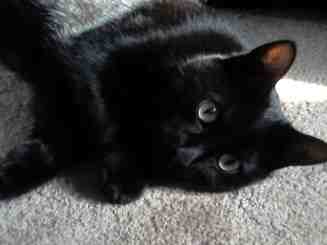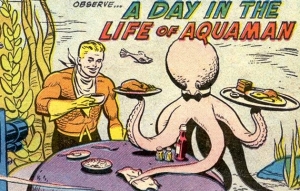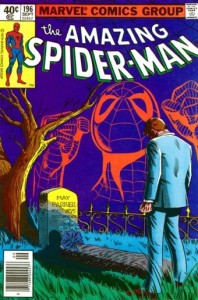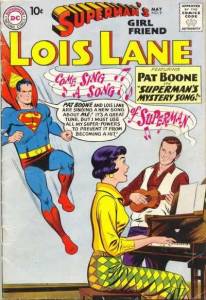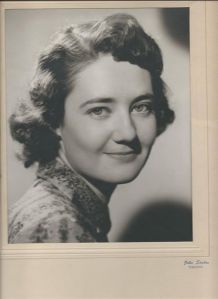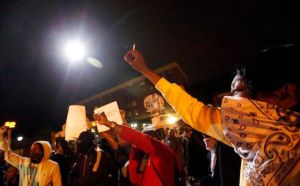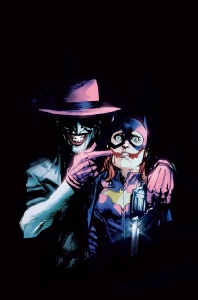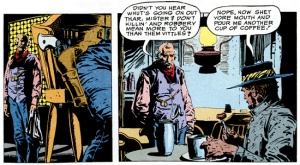I’m a cat person. I like dogs too but I find them better in theory than in execution. They’re too boisterous, too needy, too eager to please. Dogs that are cool and mellow are awesome and excellent but they tend to be rare or old. I dislike small yappy-type dogs as much as I dislike big aggressive dogs. I’m not here to try to convince you that cats are better than dogs, not at all. I’m here to remember the cats I have known and loved.
My first cat pre-dated me. Tootie had been our family pet for about seven, eight years before I came on the scene. She was a slightly plump slate-grey short-hair with a fondness for human food and a fear of mice. (Seriously. Hunting was beneath her.) She immediately took charge of me. She’d sleep in my crib with me and whenever I’d wiggle and begin to stir in the middle of the night, Tootie would go and wake up my mom by slapping her in the face. Softly, no claws but still. She was my constant companion as a child. She used to howl along with me at bath-time when I was a baby, pestering my mother who was busy trying to bathe a crying baby. Up until the day I learned how to splash. She got a face-full of water and stalked out of the bath-room, indignant. I was on my own at bath-time after that.
Tootie loved human food, particularly roast turkey. Every Christmas and Thanksgiving, she’d park herself 18 inches away from the stove and just sit there and breathe in the aroma of the cooking bird. She’d do this until she was shoo’ed away for being underfoot but she’d always return a few minutes later. When the turkey came out of the oven, she’d start yelling until she got some. She got the first bite before anyone else in the family, just to shut her up. She also loved fish and chips (well, the fish part, anyway, minus the batter) so every Good Friday, when we’d have fish and chips after Mass, the cat, who was not Catholic, would get some first. AND RIGHTLY SO, said the cat unfortunately named ‘Tootie’. Usually, it was my mom and me who sacrificed a sliver of halibut for the cat. Amen.
It used to be a given in our family that Tootie didn’t really understand or believe that she was a cat. She wasn’t interested in hunting, at all. (She was once startled by a mouse.) She’d go outside to sun-bathe, perhaps go to the bath-room discretely and that was it. She did not go outside in the winter or only very rarely. And rainy days were for nap-time. Which is eminently sensible, I think. No right-thinking sentient creature actually LIKES Winter.
She was really good with children because she had an imperiousness to her, she didn’t take any shit but she was never violent. She always got her way because that was the way it should be. She could silently control whomever she needed to, using only body language and a few choice chirps here and there. She thought she was speaking a language all reasonable people could understand. She counted herself among the reasonable people. She never splashed in the bath, for one thing.
When she was a kitten, she was sent to live with my grand-mother for a while, for some reason and my uncle bonded with her. She’d eat a plate of raw hamburger while he ate his cooked hamburger at three in the morning. She turned my uncle into the fine cat-loving gentleman that he is today. See? I told you she was a magical cat! Aren’t all cats that way?
Tootie had PERSONALITY. She was as close to a person as ever an animal I have ever known. Which made me believe, from a very young age, that ALL animals have distinct personalities (and so do candy wrappers and all other inanimate objects but that’s a story for a different time). Tootie didn’t really understand that she was a cat and we were human. She was part of the family and we, the family, were all just really bad at being a cat. I guess. Who knows how cats think? Not me, that’s for sure.
Tootie lived to be 21 years old, which is OLD, for a cat. At the end, she was so weak, she couldn’t even lift her head. It was mercy to end her life, her long, rich, intricate life. Apparently, she was named by my sister, after either an aunt that no one remembers or a forgotten song called “Toot Toot Toodles The Tug Boat”. The real answer is probably a bit of both and none of us will ever know the truth. (You’ve never met my sister. She dissembles. Nuff Said.)
Regardless, Tootie was the first cat I ever knew and loved. And boy, did I love her.

